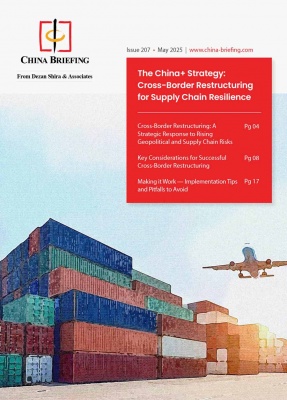China Release Draft Plan to Develop its Online Retail Industry
Oct. 4 – China’s Ministry of Commerce (MOFCOM) held a press conference last week to outline the current development of the country’s e-commerce industry and its subsequent plans to vigorously push the sector’s growth over the next few years.
Further, MOFCOM also released a draft of the “Administrative Measures for Transaction Rules of Online Retailing Conducted on Third-Party Platform (hereinafter referred to as the ‘Draft’)” to solicit public opinions on the matter, the first administrative regulation concerning online commodity trading in China from the ministerial level.
According to MOFCOM Spokesman Yao Jian, in 2012, e-commerce transactions in China amounted to over RMB8.02 trillion – which grew by 31.7 percent over figures in 2011. Of that amount, online retail sales constituted over RMB1.3 trillion, representing 67.5 percent growth year-on-year. In addition, over the first half of 2013, total online retail transactions already exceeded RMB880 billion, growing by a stunning 70 percent year-on-year despite China’s overall retail industry having slowed down recently.
To provide for a sound legal environment to further propel the development of the e-commerce industry in China, MOFCOM also recently released the “Relevant Policies on Supporting Cross-Border Online Retailing and Exporting (guobanfa [2013] No.89)” to introduce updated methods for customs supervision and cross-border settlements and updated tax policies to better fit exports sent by way of e-commerce.
These policies have already entered into force on a trial basis in Shanghai, Chongqing, Hangzhou, Ningbo and Zhengzhou, and became conditionally effective nationwide starting October 1, 2013.
The State Administration of Industry and Commerce also released a draft of the new “Administrative Measures for Online Commodity Trading and Relevant Services” on September 11 to solicit public opinion. Additional details can be found here.
In addition, the first electronic invoice after the enactment of the “Administrative Measures for Online Electronic Invoicing” was issued last June, and the “Protection Measures for Online Commercial Data” is currently under the legislative progress.
Director of the Electronic Commerce and Informatization Department Li Jinqi remarked that e-commerce has served as a key driving force to push for reforms in the distribution industry and the economic transformation of China.
The Draft
The release of the Draft to the public partly brings along the creation of a legal framework for online trading through the guidelines for online retail transaction rules set by third-party platform providers. Specifically, the Draft stipulates that all previously established transaction rules be filed for the record with MOFCOM.
According to the Draft, third-party online retail platform providers should solicit public opinion for a period of at least 15 days on a prominent location on its homepage before any new or revised transaction rules can be implemented. Further, reasonable measures should be taken to ensure that all relevant parties be made fully aware of any new rules/rule changes and that all comments/responses received should be publicized for a certain amount of time after the collection date ends.
The Draft also requires that transaction rules cover the following respects:
- Basic rules of the transaction;
- Rules for obligations and risk allocation;
- Rules for the protection of intellectual property;
- Rules for credit ratings;
- Rules for the protection of customer rights;
- Rules for the disclosure of information and real-name system;
- Rules for the treatment of illegal information;
- Rules for resolutions on disputed transactions and how violations are treated;
- Rules for application; and
- Rules for modifications.
If the implementation of any new rule is likely to significantly affect the behavior of online retailers, then the third-party platform provider must provide interim policies during the transitional period.
Compared to the 2005 “Standards for Online Transaction Platform Services,” the Draft provides for punitive measures to strengthen their effect. Specifically, third-party platform providers may be subject to fines of between RMB10,000-RMB30,000 for violations of the Draft provisions.
The Draft is currently up for public opinion/comments, and feedback can be submitted via the following methods by October 25, 2013:
- Website: To give advice or comment on the Draft, please log onto the Legislative Affairs Office of China’s State Council website;
- E-mail: Send comments to tf_liutong@mofcom.gov.cn; or
- Regular mail: Comments can be mailed directly to the MOFCOM’s Department of Treaty and Law located at 8 East Chang An Avenue, Beijing, 100731.
Dezan Shira & Associates is a specialist foreign direct investment practice, providing corporate establishment, business advisory, tax advisory and compliance, accounting, payroll, due diligence and financial review services to multinationals investing in emerging Asia. Since its establishment in 1992, the firm has grown into one of Asia’s most versatile full-service consultancies with operational offices across China, Hong Kong, India, Singapore and Vietnam as well as liaison offices in Italy and the United States.
For further details or to contact the firm, please email china@dezshira.com, visit www.dezshira.com, or download the company brochure.
You can stay up to date with the latest business and investment trends across China by subscribing to Asia Briefing’s complimentary update service featuring news, commentary, guides, and multimedia resources.
Related Reading
 Trading With China
Trading With China
This issue of China Briefing Magazine focuses on the minutiae of trading with China – regardless of whether your business has a presence in the country or not. Of special interest to the global small and medium-sized enterprises, this issue explains in detail the myriad regulations concerning trading with the most populous nation on Earth – plus the inevitable tax, customs and administrative matters that go with this.
 E-Commerce in China
E-Commerce in China
In this issue of China Briefing Magazine, we cover the current laws pertinent to the e-commerce industry in China, as well as introduce the steps involved in setting up an online shop in the country in order to help provide foreign investors with an overview of the e-commerce landscape in China.
Setting Up an Online Shop in China
China Further Promotes E-Commerce Development
MOC: China is Mulling E-Commerce Tax
- Previous Article Supporting Policies Rolled Out for Shanghai Free Trade Zone
- Next Article The Rough Guide to the Cost of Business in China – Compared to Asia



























